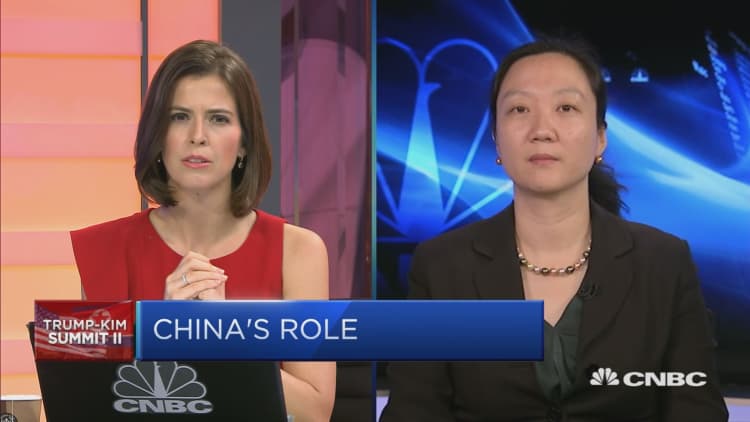When reclusive North Korean leader Kim Jong Un meets with U.S. President Donald Trump this week, he'll be aiming for a much-needed economic boom for his country.
Trump, who says his top priority is for Pyongyang not to conduct any more testing of ballistic missiles or nuclear weapons, may opt to use the lifting of economic sanctions as a negotiating tool with the pariah state, experts said.
In fact, Trump has dangled the prospect of a stronger North Korean economy ahead of the talks in Hanoi, Vietnam. He tweeted hours before meeting Kim: "Vietnam is thriving like few places on earth. North Korea would be the same, and very quickly, if it would denuclearize. The potential is AWESOME, a great opportunity... "
The U.S. president said in a separate Twitter post on Sunday: "Chairman Kim realizes, perhaps better than anyone else, that without nuclear weapons, his country could fast become one of the great economic powers anywhere in the World."
Sanctions easing or lifting
That could be a signal that Trump will use the easing of economic sanctions as a lever in this week's talks, said Anwita Basu, country risk service manager for Asia at the Economic Intelligence Unit's (EIU), who added that it would be something for which North Korea will also push.
"The EIU expects President Trump to build upon this context by offering economic sweeteners which will include some easing of sanctions against the hermit state, in exchange for a credible plan towards disarming the country of its nuclear weapons," she said.
In fact, economic ties are "much more efficient" in solving conflicts than sanctions, according to a report by the Lowy Institute, a think tank based in Australia.
"A more prosperous North Korea will be the best-case scenario for the peace process in the Korean Peninsula. And as a rule of thumb, it is always much harder to negotiate with someone who has nothing to lose," the report said.
Kim will likely "not really giving up anything" while also making "clear demands for the United States to give up things very much in the present" — such as military exercises, troop deployments and current sanctions on the rogue state, said Victor Cha, Korea chair at the Center for Strategic and International Studies, at a discussion in Washington last week.
... we doubt that a few days in Hanoi will convince Kim Jong-un that the possible benefits outweigh the risks to his dynasty.Miha Hribernikhead of Asia at Verisk Maplecroft
North Korea currently faces a host of sanctions from the United Nations, as well as unilaterally from the U.S. While the UN bars some imports and exports, and freezes the assets of some individuals associated with Pyongyang's nuclear program, the U.S. further restricts the North Korean economy and targets individuals in the country.
While Kim's ultimate goal is to secure a lifting or easing of sanctions, he is highly unlikely to give up anything that would "seriously undermine his nuclear deterrent or offer a concession that he would be unable to reverse," Miha Hribernik, head of Asia at Verisk Maplecroft, said in a note.
"A 'permanent' missile and nuclear testing freeze would fit the bill, as would proposing to close the Yongbyon nuclear complex. The latter would deprive the North of its only source of plutonium, and one of its few sources of enriched uranium," Hribernik said.
He added: "But Kim has almost certainly built up a sufficient stockpile of fissile material that would allow him to offer up the facility without undermining his defensive capabilities — particularly as this would likely be done in exchange for a major scaling back in sanctions."
Risks to Kim's dynasty
Christopher Green, senior advisor of the Korean Peninsula at the International Crisis Group, said that North Korea isn't doing as badly as expected, but it isn't booming either.
"I don't think we can say the North Korean economy is thriving … Is it doing as badly as some people might expect it to be doing? No, perhaps not, but at the end of the day they are not getting significant amounts of foreign investments at this point, and they don't have that much capital of their own. So there's no way their industrial economy is growing that much," he told CNBC in Hanoi on Wednesday.
With Kim's ambitions to open up his country, the Vietnamese economy would be the best comparative model to look at, Green added.

But Verisk Maplecroft's Hribernik said he would take suggestions of Vietnam "with a hefty pinch of salt."
"On paper, both Vietnam and China represent possible models, having developed market economies while retaining Communist Party rule," Hribernik wrote in a note.
"However, just as Kim Jong-il's multiple trips to China didn't usher in 'China-style' changes, we doubt that a few days in Hanoi will convince Kim Jong-un that the possible benefits outweigh the risks to his dynasty," he said, referring to Kim Jong Un's father, the second leader of North Korea.
Andrew Gilholm, director of Analysis for North Asia at Control Risks, also supported that view.
In a note, he wrote that while a positive summit outcome would trigger another surge in interest in North Korea's investment potential, any reforms are likely to be "very limited and will not fundamentally alter a political-economic system that poses extreme risks to investment in or doing business with North Korea."
— CNBC's Everett Rosenfeld contributed to this report.


